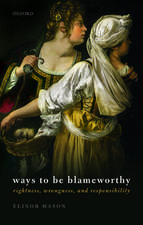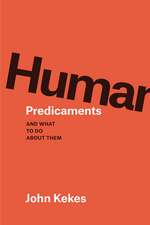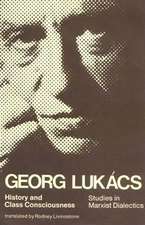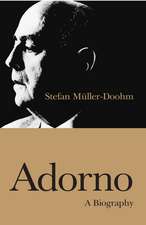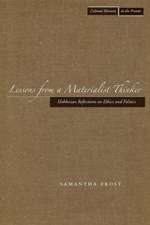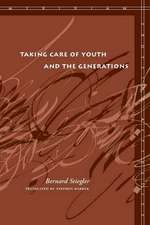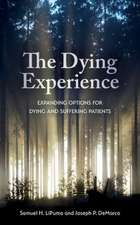Can One Live after Auschwitz?: A Philosophical Reader: Cultural Memory in the Present
Autor Theodor Adorno Editat de Rolf Tiedemann Traducere de Rodney Livingstoneen Limba Engleză Paperback – 27 mai 2003
This is a comprehensive collection of readings from the work of Theodor Adorno, one of the most influential German thinkers of the twentieth century.
What took place in Auschwitz revokes what Adorno termed the “Western legacy of positivity,” the innermost substance of traditional philosophy. The prime task of philosophy then remains to reflect on its own failure, its own complicity in such events. Yet in linking the question of philosophy to historical occurrence, Adorno seems not to have abandoned his paradoxical, life-long hope that philosophy might not be entirely closed to the idea of redemption. He prepares for an altogether different praxis, one no longer conceived in traditionally Marxist terms but rather to be gleaned from “metaphysical experience.”
In this collection, Adorno's literary executor has assembled the definitive introduction to his thinking. Its five sections anatomize the range of Adorno's concerns: “Toward a New Categorical Imperative,” “Damaged Life,” “Administered World, Reified Thought,” “Art, Memory of Suffering,” and “A Philosophy That Keeps Itself Alive.”
A substantial number of Adorno’s writings included appear here in English for the first time. This collection comes with an eloquent introduction from Rolf Tiedemann, the literary executor of Adorno’s work.
What took place in Auschwitz revokes what Adorno termed the “Western legacy of positivity,” the innermost substance of traditional philosophy. The prime task of philosophy then remains to reflect on its own failure, its own complicity in such events. Yet in linking the question of philosophy to historical occurrence, Adorno seems not to have abandoned his paradoxical, life-long hope that philosophy might not be entirely closed to the idea of redemption. He prepares for an altogether different praxis, one no longer conceived in traditionally Marxist terms but rather to be gleaned from “metaphysical experience.”
In this collection, Adorno's literary executor has assembled the definitive introduction to his thinking. Its five sections anatomize the range of Adorno's concerns: “Toward a New Categorical Imperative,” “Damaged Life,” “Administered World, Reified Thought,” “Art, Memory of Suffering,” and “A Philosophy That Keeps Itself Alive.”
A substantial number of Adorno’s writings included appear here in English for the first time. This collection comes with an eloquent introduction from Rolf Tiedemann, the literary executor of Adorno’s work.
| Toate formatele și edițiile | Preț | Express |
|---|---|---|
| Paperback (1) | 278.31 lei 3-5 săpt. | |
| Stanford University Press – 27 mai 2003 | 278.31 lei 3-5 săpt. | |
| Hardback (1) | 896.99 lei 6-8 săpt. | |
| Stanford University Press – 27 mai 2003 | 896.99 lei 6-8 săpt. |
Din seria Cultural Memory in the Present
-
 Preț: 173.10 lei
Preț: 173.10 lei -
 Preț: 197.12 lei
Preț: 197.12 lei -
 Preț: 365.56 lei
Preț: 365.56 lei -
 Preț: 193.14 lei
Preț: 193.14 lei -
 Preț: 194.26 lei
Preț: 194.26 lei -
 Preț: 155.84 lei
Preț: 155.84 lei -
 Preț: 155.89 lei
Preț: 155.89 lei -
 Preț: 149.68 lei
Preț: 149.68 lei -
 Preț: 211.98 lei
Preț: 211.98 lei -
 Preț: 228.62 lei
Preț: 228.62 lei -
 Preț: 206.94 lei
Preț: 206.94 lei -
 Preț: 209.36 lei
Preț: 209.36 lei -
 Preț: 193.58 lei
Preț: 193.58 lei -
 Preț: 156.25 lei
Preț: 156.25 lei -
 Preț: 146.22 lei
Preț: 146.22 lei -
 Preț: 171.47 lei
Preț: 171.47 lei -
 Preț: 194.45 lei
Preț: 194.45 lei -
 Preț: 229.26 lei
Preț: 229.26 lei -
 Preț: 296.64 lei
Preț: 296.64 lei -
 Preț: 210.24 lei
Preț: 210.24 lei -
 Preț: 228.62 lei
Preț: 228.62 lei -
 Preț: 298.62 lei
Preț: 298.62 lei -
 Preț: 153.16 lei
Preț: 153.16 lei -
 Preț: 193.58 lei
Preț: 193.58 lei -
 Preț: 204.76 lei
Preț: 204.76 lei -
 Preț: 228.39 lei
Preț: 228.39 lei -
 Preț: 139.64 lei
Preț: 139.64 lei -
 Preț: 243.46 lei
Preț: 243.46 lei -
 Preț: 201.90 lei
Preț: 201.90 lei -
 Preț: 152.36 lei
Preț: 152.36 lei -
 Preț: 226.40 lei
Preț: 226.40 lei -
 Preț: 169.59 lei
Preț: 169.59 lei -
 Preț: 197.12 lei
Preț: 197.12 lei -
 Preț: 194.88 lei
Preț: 194.88 lei -
 Preț: 170.65 lei
Preț: 170.65 lei -
 Preț: 194.45 lei
Preț: 194.45 lei -
 Preț: 151.12 lei
Preț: 151.12 lei -
 Preț: 194.01 lei
Preț: 194.01 lei -
 Preț: 194.45 lei
Preț: 194.45 lei -
 Preț: 208.06 lei
Preț: 208.06 lei -
 Preț: 196.69 lei
Preț: 196.69 lei -
 Preț: 142.73 lei
Preț: 142.73 lei -
 Preț: 466.13 lei
Preț: 466.13 lei -
 Preț: 167.15 lei
Preț: 167.15 lei -
 Preț: 194.45 lei
Preț: 194.45 lei -
 Preț: 173.51 lei
Preț: 173.51 lei -
 Preț: 232.11 lei
Preț: 232.11 lei -
 Preț: 207.13 lei
Preț: 207.13 lei -
 Preț: 150.09 lei
Preț: 150.09 lei
Preț: 278.31 lei
Nou
Puncte Express: 417
Preț estimativ în valută:
53.26€ • 55.27$ • 44.52£
53.26€ • 55.27$ • 44.52£
Carte disponibilă
Livrare economică 22 februarie-08 martie
Preluare comenzi: 021 569.72.76
Specificații
ISBN-13: 9780804731447
ISBN-10: 0804731446
Pagini: 560
Dimensiuni: 152 x 229 x 36 mm
Greutate: 0.76 kg
Ediția:1
Editura: Stanford University Press
Colecția Stanford University Press
Seria Cultural Memory in the Present
ISBN-10: 0804731446
Pagini: 560
Dimensiuni: 152 x 229 x 36 mm
Greutate: 0.76 kg
Ediția:1
Editura: Stanford University Press
Colecția Stanford University Press
Seria Cultural Memory in the Present
Recenzii
"Can One Live after Auschwitz? provides a very useful cross-section of Adorno's work on the task of thought after the Holocaust."—The Year's Work in Critical and Cultural Theory
"Despite his conviction that no philosophy could presume to approach an event like Auschwitz, this collection of Adorno's essays and aphorisms attests to his extraordinary effort to regard human suffering as the precondition of thought and as the undoing of all claims to totality. Adorno's cultural criticism emerges here as a moral philosophy for a 'world that has outlived its own demise.'"
—Anson Rabinbach, Princeton University
—Anson Rabinbach, Princeton University
Notă biografică
Theodor W. Adorno (1903-1969) was a prominent member of the Frankfurt School and one of the most influential thinkers of the twentieth century. Rolf Tiedemann is the literary executor of Adorno and of Walter Benjamin and the editor of the German editions of Adorno's collected works and his posthumous writings.
Textul de pe ultima copertă
"Can One Live after Auschwitz? provides a very useful cross-section of Adorno's work on the task of thought after the Holocaust."—The Year’s Work in Critical and Cultural Theory
“Despite his conviction that no philosophy could presume to approach an event like Auschwitz, this collection of Adorno's essays and aphorisms attests to his extraordinary effort to regard human suffering as the precondition of thought and as the undoing of all claims to totality. Adorno's cultural criticism emerges here as a moral philosophy for a ‘world that has outlived its own demise.’”
—Anson Rabinbach, Princeton University
“Despite his conviction that no philosophy could presume to approach an event like Auschwitz, this collection of Adorno's essays and aphorisms attests to his extraordinary effort to regard human suffering as the precondition of thought and as the undoing of all claims to totality. Adorno's cultural criticism emerges here as a moral philosophy for a ‘world that has outlived its own demise.’”
—Anson Rabinbach, Princeton University




